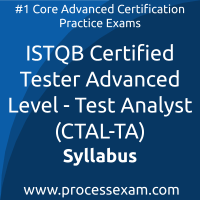 To achieve the professional designation of ISTQB Certified Tester Advanced Level - Test Analyst from the ISTQB, candidates must clear the CTAL-TA Exam with the minimum cut-off score. For those who wish to pass the ISTQB Test Analyst certification exam with good percentage, please take a look at the following reference document detailing what should be included in ISTQB CTAL-Test Analyst Exam preparation.
To achieve the professional designation of ISTQB Certified Tester Advanced Level - Test Analyst from the ISTQB, candidates must clear the CTAL-TA Exam with the minimum cut-off score. For those who wish to pass the ISTQB Test Analyst certification exam with good percentage, please take a look at the following reference document detailing what should be included in ISTQB CTAL-Test Analyst Exam preparation.
The ISTQB CTAL-TA Exam Summary, Sample Question Bank and Practice Exam provide the basis for the real ISTQB Certified Tester Advanced Level - Test Analyst (CTAL-TA) exam. We have designed these resources to help you get ready to take ISTQB Certified Tester Advanced Level - Test Analyst (CTAL-TA) exam. If you have made the decision to become a certified professional, we suggest you take authorized training and prepare with our online premium ISTQB Test Analyst Practice Exam to achieve the best result.
ISTQB CTAL-TA Exam Summary:
| Exam Name | ISTQB Certified Tester Advanced Level - Test Analyst |
| Exam Code | CTAL-TA |
| Exam Fee | USD $249 |
| Exam Duration | 120 Minutes |
| Number of Questions | 45 |
| Passing Score | 51 / 78 |
| Format | Multiple Choice Questions |
| Schedule Exam | Pearson VUE |
| Sample Questions | ISTQB CTAL-Test Analyst Exam Sample Questions and Answers |
| Practice Exam | ISTQB Certified Tester Advanced Level - Test Analyst (CTAL-TA) Practice Test |
ISTQB Test Analyst Syllabus Topics:
| Topic | Details |
|---|---|
The Tasks of the Test Analyst in the Test Process – 225 minutes |
|
| Testing in the Software Development Lifecycle |
- Summarize the involvement of the test analyst in various software development lifecycles
|
| Involvement in Test Activities |
- Summarize the tasks performed by the test analyst as part of test analysis
- Summarize the tasks performed by the test analyst as part of test design - Summarize the tasks performed by the test analyst as part of test implementation - Summarize the tasks performed by the test analyst as part of test execution |
| Tasks Related to Work Products |
- Differentiate between high-level test cases and low-level test cases
- Explain the quality criteria for test cases - Give examples of test environment requirements - Explain the test oracle problem and potential solutions - Give examples of test data requirements - Use keyword-driven testing to develop test scripts - Summarize the types of tools to manage the testware |
The Tasks of the Test Analyst in Risk-Based Testing – 90 minutes |
|
| Risk Analysis | - Summarize the test analyst’s contribution to product risk analysis |
|
Risk Control
|
- Analyze the impact of changes to determine the scope of regression testing |
Test Analysis and Test Design – 615 minutes |
|
| Data-Based Test Techniques |
- Apply domain testing
- Apply combinatorial testing - Summarize the benefits and limitations of random testing |
| Behavior-Based Test Techniques |
- Explain CRUD testing
- Apply state transition testing - Apply scenario-based testing |
| Rule-Based Test Techniques |
- Apply decision table testing
- Apply metamorphic testing |
| Experience-Based Testing |
- Prepare test charters for session-based testing
- Prepare checklists that support experience-based testing - Give examples of the benefits and limitations of crowd testing |
| Applying the Most Appropriate Test Techniques |
- Select appropriate test techniques to mitigate product risks for a given situation
- Explain the benefits and risks of automating the test design |
Testing Quality Characteristics – 60 minutes |
|
| Functional Testing |
- Differentiate between functional correctness, functional appropriateness, and functional completeness testing
|
| Usability Testing | - Explain how the test analyst contributes to usability testing |
| Flexibility Testing | - Explain how the test analyst contributes to adaptability and installability testing |
| Compatibility Testing | - Explain how the test analyst contributes to interoperability testing |
Software Defect Prevention – 225 minutes |
|
| Defect Prevention Practices | - Explain how the test analyst can contribute to defect prevention |
| Supporting Phase Containment |
- Use a model of the test object to detect defects in a specification
- Apply a review technique to a test basis to find defects |
| Mitigating the Recurrence of Defects |
- Analyze test results to identify potential improvements to defect detection
- Explain how defect classification supports root cause analysis |
Both ISTQB and veterans who’ve earned multiple certifications maintain that the best preparation for a ISTQB CTAL-TA professional certification exam is practical experience, hands-on training and practice exam. This is the most effective way to gain in-depth understanding of ISTQB CTAL-Test Analyst concepts. When you understand techniques, it helps you retain ISTQB Test Analyst knowledge and recall that when needed.
